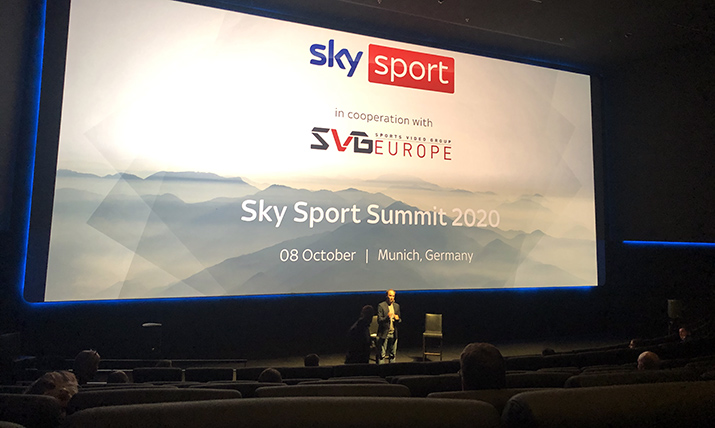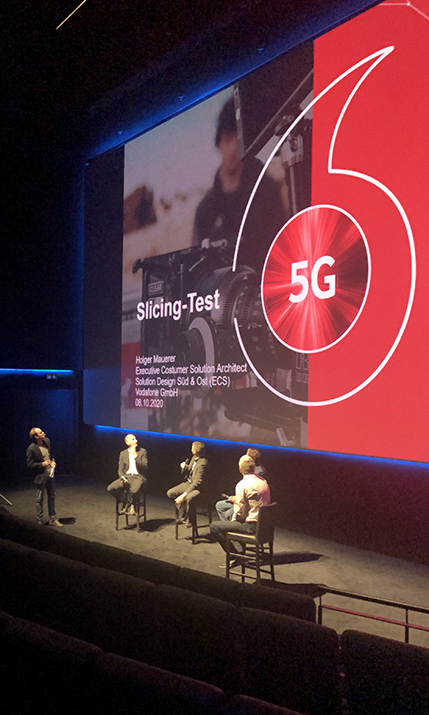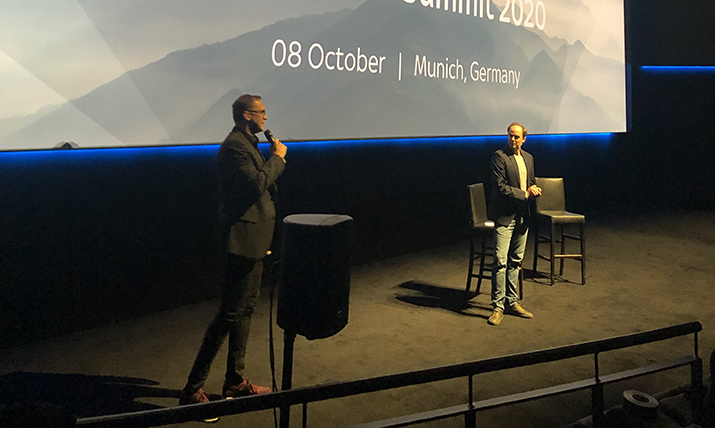Sky Summit 2020 focuses on COVID-19 innovations and challenges

Alessandro Reitano, vice president for sports production, Sky Deutschland, and chair of the SVG Europe Advisory Board, on stage at Sky Summit 2020 at Mathäser Filmpalast in Munich on 8 October 2020
As the first in-person event after seven months of lockdown, Sky Summit 2020 at Mathäser Filmpalast in Munich (8 October 2020) brought together the top decision-makers of the sports broadcast industry in Germany.
Hosted by Sky Deutschland in cooperation with SVG Europe, the main topics at the event included the management of crisis situations as well as innovations.
“It was not on our roadmap to get access to our core systems to run the broadcasting centre in a very secure way,” said Alessandro Reitano, vice president of sports production, Sky Deutschland, and chair of the SVG Europe Advisory Board. “COVID-19 pushed us there.”
Broadcasting in a pandemic
Due to COVID-19, Sky Deutschland had asked its staff to work from home. Altogether, 80% of Sky Deutschland’s employees are working remotely. “COVID-19 got us there to have access in a secure way to our live broadcast,” Reitano stressed. “That was the biggest learning curve. We are doing the whole handball season with 380 matches in fully remote operation now.”
This transition process, which might have taken ten or twenty years, moved forward within only a couple of months.
One of the questions posed on stage was how much space will be needed for productions in the future. The answer remains to be seen.
The COVID-19 pandemic brought the entire Deutsche Fußball Liga (DFL) to a halt. “We are monothematic because all we have is Bundesliga and the operation of games,” said Marcus Beisiegel, who is in charge of national audiovisual rights at DFL.
The big challenge for DFL is to secure the operation of games, create a good media product and to enable reconcilable business models in combination with occupational health and safety. “We put our focus on the restart. How we can move on and secure the revenues for the clubs? It is a challenge to roll out a media product under the conditions in a crisis.”
 During the nine week-long lockdown of the Bundesliga, the DFL also tried to figure out what a football match might look like if there are no viewers in the stadium. “We developed a concept of how we can continue the operation of games under ideal conditions, said Beisiegel. “The taskforce concept included the physical distance between the players, continuous monitoring and regular testing of players and club employees of a potential COVID-19 infection, as well as a seven-day training camp quarantine for every team.
During the nine week-long lockdown of the Bundesliga, the DFL also tried to figure out what a football match might look like if there are no viewers in the stadium. “We developed a concept of how we can continue the operation of games under ideal conditions, said Beisiegel. “The taskforce concept included the physical distance between the players, continuous monitoring and regular testing of players and club employees of a potential COVID-19 infection, as well as a seven-day training camp quarantine for every team.
The DFL’s main concern was to deliver the base signal as it is obliged to by contract using 19 or 21 cameras. All decisions were closely coordinated with Sportcast. “There were many ideas [bounced around], such as using virtual LED boards as the tribunes for a compensation of the sponsors,” says Beisiegel. “The DFL’s decision is to deliver the products as contractually agreed.”
Additionally, there is a larger audience feedback on live transmissions now. “In the future, it will be more communicated what is the USP of the Bundesliga,” said Beisiegel.
Besides technological innovations such as the production of two Bundesliga matches in UHD HDR and the Second League top games in UHD, there will be further innovations implemented, Beisiegel noted: “We are going to support Sky and test new camera systems in the stadium.”
Another aim is to improve the storytelling of the Bundesliga games with Bundesliga MatchFacts. “For 2021 we have on our roadmap to use the Bundesliga MatchFacts to create a better audience experience by the second screen, in the live signal or with camera perspectives so that we can provide our media partners with great content,” added Beisiegel.
Image and sound quality
A glimpse how great a football match can be in terms of image and sound quality was presented by Stefan Kramper, director of content and sports, Dolby Germany, with a clip from the Dortmund versus Gladbach match that was produced in UHD HDR.
“That is the best what technology has to offer right now,” stated Kramper, who upgraded the clip from Sportcast and Sky for the Dolby Cinema presentation at the summit. “Take a look at the dark pattern of lines and the bright light in the stadium as well at the skin tones. It is all in Dolby Vision and in Dolby Atmos. There is no better image and no better sound at the moment,” he claimed.
He continued: “While the number of fans at that match was limited to 9,500 spectators, hearing those people in Dolby Cinema sounded like a stadium that has been sold out.”
UHD, HDR and Dolby Atmos are part of Sky Deutschland’s technological innovations. The broadcaster wants to provide the best TV experience in Germany and it has 8K on its agenda.
Sky Q will also be improved, the audience was told, with the addition of small features that make the search and navigation of the content much easier for consumers to use. Voice remote and simple machine learning can assist users and provide them with innovative search.

Stefan Kramper, director of content and sports, Dolby Germany on stage at the SVG Europe DACH Summit 2020
Sky also sees an opportunity to increase the variety of streaming offers, although there is an admission that this is not easy.
Onwards and upwards
Because of the lockdown, there is even more appetite for content, too. The cinema entertainment package was opened up and the broadcaster did a lot of non-live programmes.
It was noted that “there is a lot of focus on live events but there is not enough focus on events during the week that engages the fans that tells them stories, that goes behind the scenes.”
Besides its acquisition of Bundesliga rights starting from season 2021/22, Sky also got exclusive rights for Formula 1 in June this year; a new 24/7 motorsports channel will become one of its flagship products going forward.
The 90 minutes on the pitch are not the end of the line as basing production functionality on IP technology is now becoming more important. “This will be an exciting time because we can feed each other lines and work on the product,” summed up Reitano.
Sky Summit 2020, produced in association with SVG Europe, took place in Munich on Thursday 8 October 2020.

